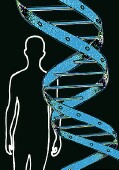 |
 |
 |
||
    |
||||
|
||||

Gene Mutation Doubles Risk of Aggressive Colon Cancer in Blacks
Study found whites much less likely to have this variant|
|
HealthDay
By Robert Preidt
Wednesday, April 1, 2009
 WEDNESDAY, April 1 (HealthDay News) -- A genetic mutation may explain why blacks are more likely than whites to have a more aggressive form of colorectal cancer, U.S. researchers report.
WEDNESDAY, April 1 (HealthDay News) -- A genetic mutation may explain why blacks are more likely than whites to have a more aggressive form of colorectal cancer, U.S. researchers report.
"Several studies have identified a disparity between African-Americans and whites for colorectal cancer. What this study does is pinpoint a possible genetic cause," study author Upender Manne, an associate professor in the pathology department at the University of Alabama at Birmingham, said in an American Association for Cancer Research news release.
They analyzed DNA from 137 black colorectal cancer patients and 236 white patients, and found that both groups had similar rates of p53 mutations. However, the frequency of Pro72 allele of p53 was found in 17 percent of blacks and in only 7 percent of whites. The Arg72 allele was found in 36 percent of whites, and in 19 percent of blacks.
The presence of Pro72 allele in blacks was associated with a more than twofold increase in death due to colorectal cancer, the researchers found.
"This paper shows that in a subset of patients with the Pro72 allele, the susceptibility to p53 mutations may be a possible molecular explanation for the racial disparity," Manne said.
The study appears in the current issue of Clinical Cancer Research.
Learning more about the relationship between molecular defects and differences in colorectal cancer incidence, aggressiveness and patient outcomes may help lead to individualized treatments and the elimination of racial disparities, the researchers wrote.
HealthDay
Copyright (c) 2009 ScoutNews, LLC. All rights reserved.
Related News:
- More News on African-American Health
- More News on Colorectal Cancer
- More News on Genes and Gene Therapy
More News on this Date
Related MedlinePlus Pages:
| Home | Health Topics | Drugs & Supplements | Encyclopedia | Dictionary | News | Directories | Other Resources | |
| Disclaimers | Copyright | Privacy | Accessibility | Quality Guidelines U.S. National Library of Medicine, 8600 Rockville Pike, Bethesda, MD 20894 National Institutes of Health | Department of Health & Human Services |
Date last updated: 02 April 2009 |
